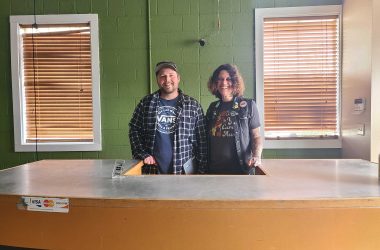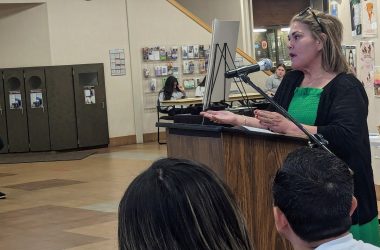Yvonne Groenhout spent her first night in Gaza trying to keep another volunteer calm.
The Salem nurse had spent over 12 hours on the road from Cairo to the Rafah Field Hospital, part of a United Nations convoy last December that included Doctors Without Borders workers and volunteers like herself with the International Medical Corps.
They’d left around four in the morning, drove all day and arrived at night.
The cacophony of bombing started around 10 p.m. Groenhout was able to remain calm because the explosions sounded far enough away from the “relatively safe” deconflicted zone they were setting up in. There, officials in Israel, Palestine, the United States and other governments were aware of their location and work. She talked her fellow volunteer, who was “freaked out,” through the worst of it.
The explosions stopped by the next morning. When they started up again the next night, they kept going.
“Day and night, and day and night. And sometimes closer, and sometimes further,” she said.
That was in December. Groenhout spent over a month working in Rafah, a city of 280,000 in southern Gaza, helping set up a field hospital that has since completed 2,000 surgeries, 20,000 outpatient consultations and delivered 70 babies. With people fleeing the north, the city’s population has grown to 1.5 million in recent months according to the Associated Press.
Groenhout is now back in Salem, where she lives with her husband who is a physician at Chemawa Indian Health Center. While volunteering at the field hospital she served Palestinian patients of all ages, from newborns to the elderly, who were seeking medicine, wound care and mental health services.
Israel declared war on Hamas, which governs the Gaza Strip, after an Oct. 7 terrorist attack which killed at least 1,200 people according to the Washington Post. Israel’s subsequent bombing campaign has killed at least 30,000 Palestinians, the majority women and children, and over 70,000 have been injured.
The airstrikes have devastated a medical system in an area about the size of Las Vegas. By January, the majority of Gaza’s 36 hospitals were shut down, leaving 16 partially functioning and just treating trauma wounds. In February, Israeli forces stormed Nasser Hospital, the main hospital in southern Gaza, killing a patient and wounding six others, according to AP News.
As a volunteer emergency response nurse with International Medical Corps, Groenhout made her position clear last fall as the U.S. based humanitarian aid organization was figuring out how to provide service to Gaza last fall.
“Whatever you need, I’m willing to go,” she said.
Groenhout’s volunteer work has taken her around the United States and across the ocean several times already.
Originally from Las Vegas, she and her husband moved to Grants Pass about 20 years ago looking for a change of pace. The rural hospital there was in need of doctors and nurses. They moved to Salem in October 2020, and she still commutes to southern Oregon when they need another pair of hands in the hospital.
When the pandemic began, she felt helpless.
“I was like, ‘I should do something, but what do I do?’” she said.
Groenhout had long been interested in volunteer work, and she wanted to do something that honored her late eldest daughter.
“(My husband and I) were like, okay, we can do this outward stuff, but inside we were still — you never get over that,” she said.
At the end of a long overnight shift at the hospital, she and a friend decided to seek out volunteer opportunities for nurses. She found the International Medical Corps website, and it said all the right things for her, namely “get involved.”
She liked the strategy of the organization, too, which has the volunteers come in to set up hospitals and clinics for vulnerable populations, then brings in the local medical professionals who were displaced from their work before turning the operation over to them. She said it’s better to help people be self-sufficient, and local teams know more about the culture and medical laws of their country to provide efficient and lasting care.
Her first assignment was in Chicago, helping relieve the nurses there working overtime to help Covid patients. She later helped vaccinate people in Los Angeles and Corpus Christi, Texas, traveling to schools, nursing homes and community centers with lines out the door.
The work also took her to Haiti after the earthquake and presidential assassination in 2021. She went to Ukraine twice to teach nurses how to prevent patients from bleeding out, how to triage during mass casualty events and how to train other nurses to do the same.
In December, she and her husband were home in Salem. The couple are big Michigan fans and were anxiously awaiting the news of which team would be playing them in the Rose Bowl. They had plans to attend a bucket list game for both of them.
Hours away from the announcement, Groenhout got an email from International Medical Corps asking if she could help in Gaza. It took them less than a minute to decide football could wait.
“There’ll be other Rose Bowls,” she recalled her husband saying. She was on a plane to Cairo the next weekend.
Groenhout’s Gaza team included nurses and doctors from Jordan and a biomedical engineer from Egypt.
Their mission was to set up an outpatient clinic with tents for various medical needs: women’s health services, nutritional care for children and pregnant and nursing women, an emergency room, a pharmacy and a mental health services tent. A tent intended to be used for quarantine was later turned into a wound care tent due to need. Surgeries were done in something that looked to her like a converted shipping container.
She had expected a slow day when they opened the hospital, before people had a chance to spread the word about their services. They opened the door that first day to a flood of 200 babies, men, women and children.
The next day twice as many came, and every following day began with a line of patients waiting when they opened..
The field hospital was next to the Mediterranean Sea, and it was freezing cold at night. They only had internet half the time, and ran out of gas for three days with no way to cook or heat water.
When the team’s work started, Groenhout, having worked in dire situations before, told them what to prepare for mentally. The limited supplies meant that during mass casualty events, like when whole buildings collapsed due to bombardment, they’d have to tell people with broken bones to wait as others were treated. There’d be no MRIs, and many tough decisions.
“You’re going to be frustrated because it’s something that you could probably easily get if you were somewhere else,” she said. They had two ventilators for patients, both used in the operating rooms, meaning there weren’t any available for others who needed help breathing.

As an ICU nurse with over 26 years of experience, she said she avoids getting too emotional about individual patients. What sticks with her are the little things, like seeing kids smile or knowing a baby was born in a clean space with food available.
She didn’t see much of Gaza, sticking to the deconflicted zone, but still saw haggard donkeys hauling carts of belongings, piles of rubble where buildings once stood and people sitting on the ground selling cans of food. Armed guards were on top of supply trucks to dissuade desperate people from climbing aboard.
“It’s hard to believe that we’re in this day and age and this kind of thing is still happening,” she said. “I don’t get war.”
In the weeks she was there, empty fields near their hospital filled with dozens of tents as more Gazans were pushed to the south.
”You want to just give them everything you have. I didn’t have anything to give them, though, except what we could offer at the hospital which was attending to their medical needs, their mental health needs,” she said. She, like the other volunteers, had brought in all the food she’d eat that month in a backpack.
Groenhout said no matter where she’s worked, whether with refugees in Gaza or people addicted to drugs in Grants Pass, everyone is a person, and everyone needs help at some point during their lives.
It’s not always medicine. Sometimes it’s holding their hand, or telling them they’re important. She said that’s especially important to say to the mothers who are worried about their children, not themselves.
Rifle fire, rockets and shells were constant background noise that she learned to disassociate from so she could get through the day. It saddened her to see Palestinian children doing the same, playing as if they couldn’t hear the bombs.
“This is not how children should have to grow up,” she said.
Groenhout returned to Salem on January 16, and said she likely would go to Gaza again if asked. Volunteers at the field hospital have reported that the fighting has gotten so close, it feels like they’re doing surgery during constant earthquakes, according to the organization.
“I love doing this work, but I’d be happy to not have another war to go to,” she said.

Contact reporter Abbey McDonald: [email protected] or 503-575-1251
SUPPORT OUR WORK – We depend on subscribers for resources to report on Salem with care and depth, fairness and accuracy. Subscribe today to get our daily newsletters and more. Click I want to subscribe!
Abbey McDonald joined the Salem Reporter in 2022. She previously worked as the business reporter at The Astorian, where she covered labor issues, health care and social services. A University of Oregon grad, she has also reported for the Malheur Enterprise, The News-Review and Willamette Week.









